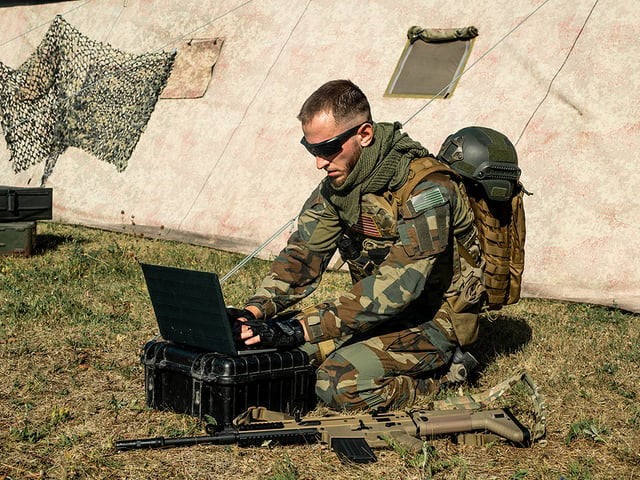
Why It’s Important to Take an ASVAB Practice Test
Whether you’re a bustling high school student balancing a hefty load of homework, an after-school job, and a social life, or a high school graduate who’s exploring the prospect of a military career after a hiatus from academics, the ASVAB (Armed Services Vocational Aptitude Battery) might appear as a formidable challenge. This comprehensive test, encompassing a wide range of topics from Arithmetic Reasoning to General Science and even something as peculiar-sounding as Assembling Objects, can seem intimidating, especially when your already busy schedule leaves little room for test prep.
But, you may ask, is it really worth devoting precious time and energy to study for the ASVAB? The straightforward answer is a resounding yes. Your performance on the ASVAB is not merely a matter of passing or failing—it plays a crucial role in shaping your military future. Your ASVAB score is the gatekeeper that determines both your eligibility to enlist in the military and the range of vocational roles you’ll be qualified for. By preparing for the ASVAB, you are taking an important step towards realizing your military aspirations.
What is the ASVAB?
To provide a deeper understanding, let’s unpack the ASVAB a little more. Short for Armed Services Vocational Aptitude Battery, the ASVAB is a series of tests administered by the United States Military Entrance Processing Command. Its purpose is to determine qualification for enlistment in the United States Armed Forces, and, additionally, to assign those qualified with a military occupational specialty.
While the ASVAB might seem like a single exam, it is, in reality, a battery of tests, each focusing on a different skill or area of knowledge. It consists of nine distinct subjects, providing a comprehensive measure of your abilities, skills, and knowledge in different areas.
General Science (GS)
This portion tests your knowledge of life science, earth and space science, and physical science. It’s designed to assess your understanding of scientific concepts, principles, and terminology.
Paragraph Comprehension (PC)
This section examines your ability to extract information from written material. You’ll be presented with short passages and asked to answer questions about them, testing your ability to understand and analyze written information.
Word Knowledge (WK)
In this segment, your vocabulary and language understanding are put to the test. It consists of multiple-choice questions asking you to find synonyms for given words or use words correctly within context.
Mathematics Knowledge (MK)
Here, your mathematical abilities are gauged, particularly focusing on high school-level mathematics. This includes topics like algebra, geometry, and basic arithmetic.
Arithmetic Reasoning (AR)
This section tests your problem-solving skills using basic arithmetic. It’s less about direct calculations and more about applying math concepts to solve word problems.
Assembling Objects (AO)
In this interesting section, your spatial awareness and ability to understand how different pieces fit together are tested. It involves visualizing and manipulating objects in a spatial context.
Electronics Information (EI)
This part assesses your knowledge of electrical systems, devices, circuits, and the principles of electricity. It is especially relevant if you’re interested in occupations related to electronics or electricity.
Auto and Shop Information (AI & SI)
This section gauges your understanding of automobile technology and basic shop practices. It’s not just about cars and tools; it also tests your comprehension of principles underlying these technologies.
Mechanical Comprehension (MC)
Finally, this section examines your understanding of basic mechanical principles and devices. It’s designed to measure your knowledge of mechanical and physical principles, as well as your ability to visualize how illustrated objects work.
Altogether, the ASVAB is a wide-ranging test designed to measure your aptitudes in various fields. Your performance in these fields helps the military determine your potential for success in different military occupational specialties. This is why the ASVAB is not merely a hurdle to pass, but a critical tool to match you with the roles you are most likely to succeed in.
AFQT Scores
The AFQT, or Armed Forces Qualification Test, is essentially a subset of the ASVAB. It is the cumulative score from four specific subjects out of the nine on the ASVAB: Paragraph Comprehension, Word Knowledge, Mathematics Knowledge, and Arithmetic Reasoning. This score plays a major role as it’s used to determine eligibility for enlistment in the military.
Role of AFQT Scores
The AFQT scores are reported as percentiles between 1-99, which represent how your score compares to the scores of a nationally representative sample of 18 to 23-year-olds. For instance, if you receive an AFQT score of 65, this implies that you scored as well or better than 65 percent of the national sample.
The importance of the AFQT score cannot be overstated as it’s not just about qualifying for the military; it can also impact the level of opportunities available to you within the military. Certain jobs or training programs may require a higher AFQT score.
Subjects Counted in the AFQT Score
Let’s delve a little deeper into the four subjects that contribute to the AFQT score:
-
Paragraph Comprehension (PC): This section tests your ability to obtain information from written passages. You’ll need to understand the content, draw inferences, and apply logic to answer the questions accurately.
-
Word Knowledge (WK): This measures your understanding and command of the English language. You’ll be asked to find synonyms, use context clues to determine the meaning of words, or pick the correct meaning for a word.
-
Mathematics Knowledge (MK): This section assesses your knowledge and ability to solve problems based on high school-level mathematics, including both algebra and geometry.
-
Arithmetic Reasoning (AR): This portion looks at your ability to solve arithmetic word problems. It’s less about straightforward calculations and more about reasoning, hence requiring a good understanding of mathematical principles.
The AFQT score is calculated by combining the scores from these four sections, with extra weight given to the Mathematics and English language sections. It’s interesting to note that even though the ASVAB contains nine subjects, the AFQT score calculation is limited to these four crucial areas.
Differences in Branch Requirements
While the AFQT score is used across all branches of the military to determine eligibility, each branch has its own minimum qualifying score. For example, the Army requires a minimum AFQT score of 31, while the Air Force requires a 36. The Navy, Marines, and Coast Guard also have their own respective minimum scores. This demonstrates the importance of researching and understanding the specific requirements for the branch of the military you’re interested in joining.
Ultimately, when you hear someone talk about their ASVAB score, they are typically referring to their AFQT score, as it is the key determining factor for their military eligibility. That’s why understanding your AFQT score and striving to achieve the highest score possible is crucial for anyone considering a military career.
Composite (Line) Scores
Beyond the AFQT, the military also uses a method called composite, or “line scores”, to help determine which jobs you qualify for. Every branch of the military offers different jobs, and these jobs are referred to by different names depending on the branch you are serving in.
If you are in the Army, Navy, or Marines your job is your “Military Occupational Specialty,” or MOS for short.
If you’re in the Navy or Coast Guard, your job is calling a “rating” or “rate.”
In the Air Force, your job is you “Air Force Specialty Code,” or ASFC.
Line scores are different combinations of the ten subjects of the ASVAB. For example, in the Army if you would like a General Maintenance (GM) job, your line scores will look at how you did on the General Science, Auto & Shop, Mathematics Knowledge and Electronics Information sections. If you were hoping for a Clerical job (CL), your line scores would focus on your results in the Word Knowledge, Paragraph Comprehension, Arithmetic Reasoning and Mathematics Knowledge sections. So while you can not technically pass or fail the ASVAB, your score helps determine which jobs you qualify to apply for.
Why You Should Study for the ASVAB
Preparing for the ASVAB goes beyond just ensuring your enlistment into the military—it’s about maximizing your potential and expanding your career opportunities within the service. The ASVAB isn’t a traditional pass or fail test, but the score you achieve significantly influences your military career path. This highlights the importance of preparation to attain the best possible score.
Broadening Your Opportunities
One of the crucial reasons to prepare for the ASVAB is to broaden your career opportunities within the military. The military offers a wide array of jobs, and a higher ASVAB score can provide you with more options when deciding your military career. If you score well across the various sections, you’re less likely to face limitations when exploring different military occupations. It’s always better to have more opportunities available, offering you a choice rather than being confined to a narrow career path due to a limited ASVAB score.
Tailoring Your Study Approach
While the test covers a broad range of subjects, it’s not necessary—or indeed practical—to study everything equally. Focusing on your weak areas, particularly the sections that comprise the AFQT, can be more beneficial. These areas are critical for your enlistment and will influence your overall ASVAB score.
If you already have a specific job or role in mind—let’s take Field Artillery, for instance—it’s wise to identify the relevant sections that contribute to that job’s line score. Dedicate a significant portion of your study time to mastering these areas.
Leveraging Practice Tests and Study Aids
Utilizing ASVAB practice tests is an invaluable part of your preparation. Practice tests not only help you identify areas you need to focus on, but they also familiarize you with the test format and question style, alleviating test-day anxiety. They allow you to gauge your progress and apply what you’ve learned in a realistic testing environment.
Supplementing your study with resources such as ASVAB flashcards and study guides can help reinforce your learning and ensure you thoroughly understand the material. These tools are designed to aid your comprehension and recall of key concepts, improving your overall performance on the test.
Engaging with a Recruiter
Your recruiter is an excellent resource when preparing for the ASVAB. They have extensive experience guiding recruits through the enlistment process and can offer valuable advice and insights. Discuss your potential career interests with them, express any concerns you have about the test, and don’t hesitate to ask for guidance. Their support and knowledge can help inform your study strategy and boost your confidence heading into the test.
Get Ready for ASVAB Success!
To sum up, diligent preparation for the ASVAB goes beyond securing your enlistment—it’s an investment in your future military career. It’s not just about passing the test but about scoring high enough to access a wide array of vocational opportunities within the military. By dedicating time and effort in your preparation, you are laying the foundation for a successful military journey, potentially opening doors to fulfilling roles that align with your personal interests and skills. Remember, every hour spent studying for the ASVAB is a step towards shaping a promising future in the military.

Keep Reading

Armed Services Vocational Aptitude Battery Blog
What is the ASVAB Test?
The Armed Services Vocational Aptitude Battery, known as the ASVAB, is …

Armed Services Vocational Aptitude Battery Blog
Military MOS Codes
Military Occupational Specialty (MOS) codes are an integral part of the…

Armed Services Vocational Aptitude Battery Blog
U.S. Army Height and Weight Standards for Females
The U.S. Army’s commitment to maintaining a robust, physically fit, and…